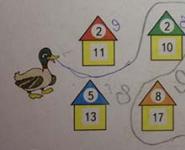Civil procedure of Treushnikov 5th edition. Legal status of foreign citizens
The book by our compatriot Elena Trepelkova is by no means just another collection of advice on raising children. This is a book about choice - primarily
first of all, about the choice made by a woman who has decided that the main goal of her life is to raise her children free, happy and successful. And about choosing methods to achieve this goal - about daily hard work and correct prioritization.
For a wide range of readers.
New
In the book "REJOICE!" included poetic texts written in 2015–2019. The text of “Metamorphoses” was written in 1999. Along with the traditional, horizontal method of reading from beginning to end, the author recommends using the experimental, vertical method, when the book is opened in any random place. Neither the author nor the publisher bears any responsibility for possible miracles.
Pre-order
Under the cover of his first book, “Artists of Difficult Behavior,” Vladimir Polupanov collected his memories of meetings with heavyweights of the music industry. A poignant interview with producer Vladimir Kiselyov is published for the first time. Next to him on the pages of the book is his opponent in musical battles, Igor Krutoy. Few journalists have had the opportunity to have a heart-to-heart conversation with Alla Pugacheva several times throughout their career; Vladimir Polupanov is one of them. Here is the long-term “war” with Philip Kirkorov and the trial with Lolita and Alexander Tsekalo. And between reports from the fronts of show business - stories about Otar Kushanashvili, Ivanushki Int. and other friends and acquaintances, imbued with the irony characteristic of Polupanov - it accompanies any text signed by him.
The culmination of “Artists of Difficult Behavior” is a previously unpublished interview with Sergei Kuryokhin, which transfers everything described by Polupanov into the category of total absurdity. This is the only way to write about our music.
This planet will enchant. You will be pleased to smell the smells of Ilo the Seven Moons and enjoy the picturesque views. Here no one is able to take away the peace of the night from the inhabitants of this exotic and generous world. They will tell you that heaven under the seven moons is not for everyone, but it is difficult for a stranger to believe this. So the dangers experienced by the heroes on the edge of the galaxy were just the beginning of their trials.
The next difficult exam awaited the young space explorers in the jungles of Ilo Semilunny. They tried to survive among the metamorphic plants, but three nights on the planet is enough time to understand: a new dawn will not come for everyone...
New
Space is beautiful, attractive and deadly. Pilot Nikolai Pavlov drove cargo flights around solar system, but dreamed of being among the first to go to distant stars. Removed from his favorite job for disobeying official instructions, capable of exchanging his career for saving people, prickly, always knowing everything better than others, Pavlov did not find the love of his superiors. But man
capable of surviving a disaster, and even saving other people, attracted the attention of crazy people who decided to go on the first flight to an alien star in the fragile shell of a research ship. The pilot's dream is ready to come true. There is only one “but”: this journey is a one-way ticket...
New
This book contains short prose by Pavel Krusanov (“Angel’s Bite”, “Bom-Bom”, “American Hole”, etc.) - a writer without whom it is impossible to imagine modern Russian literature, and Russian literature in general.
New
The publication demonstrates the diversity of trends in the field of science of civil procedural law. The author's first publication, presented in the book, dates back to the period of his activity as a judge of the Moskvoretsky District People's Court of Moscow. Subsequently, he was interested in the protection of rights arising from public legal relations, the field of comparative law. For ten years he worked as deputy dean for educational work at the Faculty of Law of Moscow State University named after M.V. Lomonosov and worked on teaching methods. Legal ideas voiced by scientists to the scientific community in reports, speeches, interviews are still relevant today.
The book is intended for students, graduate students, teachers, law schools, researchers, judges, representatives of the parties and other practical workers of justice.
It can be used as a teaching aid for programs in various disciplines and when writing coursework and theses students enrolled in both undergraduate and graduate programs.
Citizens can conduct cases in court in person or through representatives. The affairs of incapacitated persons are conducted by their legal representatives, the affairs of legal entities are conducted by their bodies acting within the powers granted to them by law, charter or regulation, or by their representatives.
Judicial representatives are persons who, on the basis of the powers granted to them, act in court on behalf of the represented person in order to achieve the most favorable decision for him, as well as to assist him in the exercise of his rights, prevent their violation in the process and assist the court in administering justice in civil cases.
Judicial representation should be understood as the activities of a representative in civil proceedings, carried out by him for the purposes indicated above.
The need for judicial representation is due to various reasons. Some persons participating in the trial may not have civil procedural capacity (minors, persons recognized by the court as incompetent) Since incompetent citizens cannot conduct cases in court, their rights are protected by representatives (parents, adoptive parents, guardians)
Legal entities headed by collegial bodies (boards) also cannot directly participate in the consideration of the case and are forced to resort to the help of a judicial representative. Finally, the need for representation is often caused by the desire of interested parties to receive qualified legal assistance when considering their civil cases in court.
Representation in civil proceedings is intended to provide legal assistance to citizens and organizations, to promote the protection of their rights and legitimate interests, the administration of justice, and the observance and strengthening of the rule of law. The participation of a judicial representative in the process contributes to a more complete clarification of all the circumstances of the case, the manifestation of initiative and activity of the participants in the process.
Representation in civil proceedings is of great importance and serves as an important guarantee in ensuring the protection of the rights and legally protected interests of citizens and organizations. In connection with this legislation
The law has established a wide range of persons who can participate as representatives in court.
According to the current Code of Civil Procedure, representatives in court can be:
1) lawyers; 2) employees of state enterprises, institutions, organizations, collective farms, other cooperative organizations, their associations, and other public organizations - on the affairs of these enterprises, institutions and organizations; 3) authorized representatives of trade unions - in matters of workers, employees, collective farm members, as well as other persons whose rights and interests are protected by trade unions; 4) authorized organizations, which law, charter or regulation grants the right to protect the rights and interests of members of these organizations; 5) authorized organizations by which law, charter or regulation grants the right to protect the rights and legitimate interests of other persons; 6) one of the accomplices on behalf of other accomplices; 7) persons admitted by the court hearing the case to represent the case (Article 44 of the Code of Civil Procedure)
The list of persons given in the law who can be representatives in court is quite long, but nevertheless not complete. In particular, it does not indicate patent attorneys, employees of law firms, etc. At the same time, taking into account that it is impractical to endlessly expand this list, it seems more correct to state the rule regarding persons who have the right to represent in court in the following wording: “A representative in court can be any capable person who has a duly formalized authority to conduct a case in court.”
The rights and legally protected interests of incapacitated citizens who do not have full legal capacity, and citizens recognized as having limited legal capacity, are protected in court by their legal representatives - parents, adoptive parents, guardians and trustees.
At the same time, the law also determined the circle of persons who cannot participate in the process as judicial representatives.
Representatives in court cannot be persons who have not reached the age of majority or are under guardianship or trusteeship, as well as lawyers who have accepted orders to provide legal assistance in violation of the rules established by law. Persons expelled from the bar cannot be admitted by the court to representation in the case provided for in paragraph 7 of Art. 44 Code of Civil Procedure.
The law prohibits investigators, prosecutors and judges from participating as representatives in court. This rule does not apply to performances in
process of these persons as authorized representatives of the court, prosecutor's office or as legal representatives.
Not all participants in the process can conduct a case through a representative in court, but only the parties, applicants and others interested people, in particular, in cases of special proceedings, third parties with independent claims, third parties without independent claims on the subject of the dispute.
Judicial representation is possible in all categories of civil cases in the court of first instance, in the cassation and supervisory instances, when reviewing decisions that have entered into legal force based on newly discovered circumstances and when executing court decisions.
On behalf of Russian Federation, constituent entities of the Russian Federation and municipalities, authorized representatives of state bodies and local self-government bodies act in court within the limits of their competence established by regulations or other acts defining the status of these bodies. By special order of these entities, authorized representatives of state bodies, local governments, as well as representatives of departments, organizations, other legal entities and citizens can appear in court on their behalf.
To fulfill the assigned tasks, the representative enters into relations with the court. These relations are regulated by the rules of civil procedural law and are procedural in nature. The relations between the representative and the represented are regulated by the norms of substantive law (civil, family, labor, etc.) and, by their nature, represent substantive legal relations. For example, relations arising from an agency agreement (Articles 182-189 of the Civil Code) will be civil relations, relations between parents and children will be family relations.
The representative acts in the process on behalf of the represented person. The formula “speaking on behalf of the represented person” in this case means lawful procedural actions of a judicial representative, performed within the limits of his powers in relation to the court, aware of the representative nature of these actions, and aimed at obtaining certain legal results for the represented person.
Participation in the process of a judicial representative does not remove the represented person (plaintiff, defendant, applicant, etc.) from the case. It is worth noting that he can participate in the case together with his representative.
Judicial representation is an independent institution, and it is extremely important to distinguish it from other legal institutions.
The institution of judicial representation differs significantly from representation in civil law. They can be distinguished by many characteristics: by the goals and nature of the relationship between the representative and the represented, by the subject composition, by the grounds for their occurrence, by the legal consequences that the issuance of an order to perform legal actions entails, etc.
There is no single point of view on the issue of the procedural position of the representative in civil proceedings. It is important to note that some scholars believe that representatives will not be persons participating in the case, while others consider them to be among the persons participating in the case. The second point of view seems more correct. The judicial representative will be the subject of civil procedural relations, has a procedural interest in the process, and through their actions influences the development of the process. It is worth noting that he has independent procedural rights and obligations. For failure to fulfill their procedural duties, he may be brought to procedural liability.
The textbook covers the procedure for legal proceedings in civil cases in courts of general jurisdiction, including justices of the peace. The basics of knowledge about the arbitration process and non-judicial forms of protection of rights (notarial and arbitration) are also outlined. The content takes into account changes in current legislation as of July 1, 2013. The program of the academic discipline “Civil Procedure”, a list of recommended educational literature, methodological recommendations for studying the course are presented, materials from the ATP “ConsultantPlus” and “Garant” are used.
For undergraduate students, graduate students, teachers of law universities and faculties, judges, prosecutors, lawyers, and other practitioners of legal departments and services.
PROCEEDINGS IN THE COURT OF FIRST INSTANCE.
Topic 18. Initiation of a civil case in the court of claims
Procedure for filing a claim. Consequences of its violation. Statement of claim and its details. The procedure for correcting deficiencies in the statement of claim.
Acceptance of the claim. Grounds for refusal to accept an application. Legal consequences of initiating a civil case.
Topic 19. Preparing cases for trial.
Preparing cases for trial and its importance. Tasks of preparing cases for trial. Procedural actions of the parties, judges in preparing a civil case for trial. Connection and separation of claims. Preliminary hearing. Assignment of the case for trial.
By buttons above and below “Buy a paper book” and using the “Buy” link you can buy this book with delivery throughout Russia and similar books throughout best price in paper form on the websites of official online stores Labyrinth, Ozone, Bukvoed, Read-Gorod, Litres, My-shop, Book24, Books.ru.
Click the “Buy and download” button e-book» you can buy this book at in electronic format in the official liters online store, and then download it on the liters website.
By clicking the “Find similar materials on other sites” button, you can find similar materials on other sites.
On the buttons above and below you can buy the book in official online stores Labirint, Ozon and others. Also you can search related and similar materials on other sites.
Publication date: 12/22/2016 17:24 UTC
- Labor Code of the Russian Federation in aphorisms, Sidorov S., Maleshin V.
- Regulatory and legal support for special and inclusive education, Grinina E.S., 2015
- Fundamentals of constitutional law, Textbook for 9th grade schools of general secondary education, Tansykbaeva G.M., Kostetsky V.A., 2019
- Human rights, 11th grade, Bolotina T.V., Pevtsova E.A., Mikov P.V., Suslov A.B., Smirnov V.V., 2007
The following textbooks and books.


